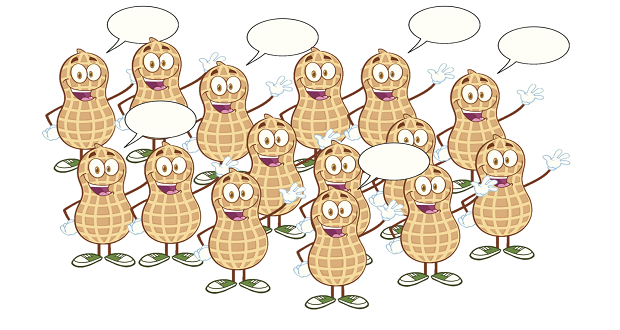
I realize that you may not agree with all of the “Words and Phrases That Sting” that we are highlighting in this series and that’s OK. The goal is less to convince you and more to get you to question the potential insensitivity and history behind some commonly used expressions. I fully realize that there will always be critics from the peanut gallery.
Hold on. The what?
It turns out that the “peanut gallery” is itself a possibly problematic phrase. Usually, when people utter the expression, they are referring to unwelcome commentary or heckling, particularly opinions from seeming know-it-alls. As in, “I think that’s enough from the peanut gallery,” essentially a lighter version of, “Shut up!”
However, the term has a dark origin—literally. Many years ago, it referred to Vaudeville theaters’ cheapest and worst balconies, where Black people typically sat. This excerpt from Nancy Beggett’s The All-American Cookie Book explains the connection to peanuts:
“Peanuts have never gotten much respect in America. Their reputation is better than it once was, but if something is ‘worth peanuts,’ but if something is ‘worth peanuts,’ we know it’s trifling. Perhaps the root of the problem—so to speak—was that peanuts were first introduced to America by African slaves. During the Civil War, when food supplies were scarce, both Union and Confederate troops started eating these legumes out of necessity and they became popular. By 1870, P.T. Barnum’s vendors were hawking peanuts at his circus. Soon, they were also sold in theaters, where the cheap seats became known as ‘peanut galleries.’”
In other words, peanuts = cheap = Black. As author Stuart Berg Flexner points out in Listening to America: An Illustrated History of Words and Phrases From Our Lively and Splendid Past, “Peanut gallery was in use in the 1880s, as a synonym for nigger gallery (1840s) or nigger heaven (1870s), the upper balcony where blacks sat, as in segregated theaters.”
Here’s another troublesome expression: “sold down the river.” It’s generally synonymous with betrayal, as in, “I asked her to keep my secret, but she sold me down the river.”
During times of slavery, though, the “river” referred to the Mississippi or Ohio rivers. One of the largest slavery-trading posts was in Louisville, Ky., from which slaves were “sold down the river” to southern plantations. In his book Wicked River, Lee Sandlin writes that “the threat of being ‘sold down the river’ was seen as tantamount to a death sentence.” Or at least a lifetime of hard labor and abuse.
In Slavery and Crime in Missouri, 1773-1865, writer Harriet C. Frazier offers this harrowing journal entry detailing a slave’s suicide: “A Negro man of Mr. Elies, having been sold to go down the river, attempted first to cut off both of his legs, failing to do that, cut his throat, did not entirely take his life, went a short distance and drowned himself.”
The point of course is that when we examine the roots of some of our seemingly harmless idioms, their meanings grew out of periods in our history that we would just as soon forget…bury. However, for those who cannot bury the memories, the words still sting.
We appreciate those of you who have written us about other words and phrases that sting. Let’s keep the dialogue going!


















